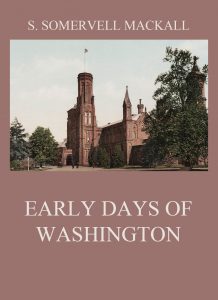Early Days Of Washington – S. Somervell Mackall
Miss Mackall in the ‘Early Days of Washington’ has written and compiled one of the first histories of Washington and of the District of Columbia which shows mark of authority and careful preparation. The work is the result of years of study and toil, and we have, in consequence, a book of more than local interest. It is, necessarily, largely biographical, and here Miss Mackall has had exceptional facilities. Belonging to one of the oldest and best-known of the District families, her forefathers being socially thrown with the makers of Washington history, many incidents of interest, which otherwise would have been lost, have been handed down and are now told in print for the first time. Says The Washington Evening Star: “It reads almost like a romance. There was much to fill the lives of the residents then that is absent now. The social existence was essentially different, the community was closer together and more self-dependent.”
Format: Paperback.
Early Days Of Washington.
ISBN: 9783849672461.
Available at amazon.com and other venues.
Basics on Washington, D.C. (from Wikipedia):
Washington, D.C., formally the District of Columbia and commonly referred to as Washington or D.C., is the capital of the United States of America. Founded after the American Revolution as the seat of government of the newly independent country, Washington was named after George Washington, first President of the United States and Founding Father. Washington is the principal city of the Washington Metropolitan Area, which has a population of 6,131,977. Washington is described as the political Capital of the World, owing to its status as the seat of the United States Federal Government and numerous international institutions, such as the World Bank and International Monetary Fund. Washington is one of the most visited cities in the world, with more than 20 million annual tourists.
The signing of the Residence Act on July 16, 1790, approved the creation of a capital district located along the Potomac River on the country’s East Coast. The U.S. Constitutionprovided for a federal district under the exclusive jurisdiction of the Congress and the District is therefore not a part of any state. The states of Maryland and Virginia each donated land to form the federal district, which included the pre-existing settlements of Georgetown and Alexandria. Named in honor of President George Washington, the City of Washington was founded in 1791 to serve as the new national capital. In 1846, Congress returned the land originally ceded by Virginia; in 1871, it created a single municipal government for the remaining portion of the District.
Washington had an estimated population of 693,972 as of July 2017. Commuters from the surrounding Maryland and Virginia suburbs raise the city’s population to more than one million during the workweek. The Washington metropolitan area, of which the District is the principal city, has a population of over 6 million, the sixth-largest metropolitan statistical area in the country.
All three branches of the U.S. Federal Government are centered in the District: U.S. Congress (legislative), President (executive), and the U.S. Supreme Court (judicial). Washington is home to many national monuments and museums, which are primarily situated on or around the National Mall. The city hosts 177 foreign embassies as well as the headquarters of many international organizations, trade unions, non-profit, lobbying groups, and professional associations, including the Organization of American States, AARP, the National Geographic Society, the Human Rights Campaign, NASA, the International Finance Corporation, and the American Red Cross.
A locally elected mayor and a 13‑member council have governed the District since 1973. However, Congress maintains supreme authority over the city and may overturn local laws. D.C. residents elect a non-voting, at-large congressional delegate to the House of Representatives, but the District has no representation in the Senate. The District receives three electoral votes in presidential elections as permitted by the Twenty-third Amendment to the United States Constitution, ratified in 1961.
(The text of the last section was taken from a Wikipedia entry and is available under the Creative Commons Attribution-ShareAlike License.)
Publisher’s Note: This book is printed and distributed by Createspace a DBA of On-Demand Publishing LLC and is typically not available anywhere else than in stores owned and operated by Amazon or Createspace.

